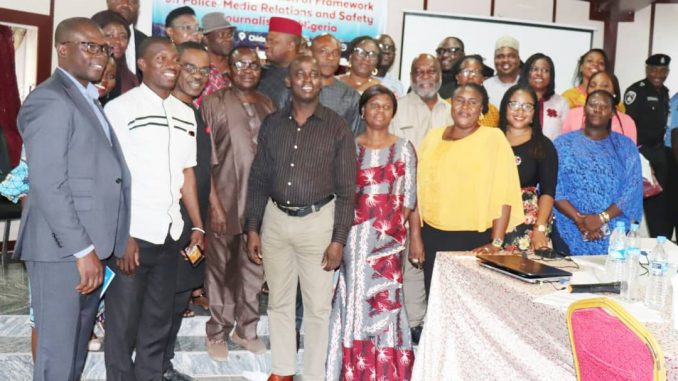
By Kemi Yesufu
The National Union of Journalists (NUJ), the National Press Council (NPC) and other stakeholders in the media profession on Thursday adopted a framework on the safety of journalists.
The adoption of the 18-page document, which also covers police and media relations, followed hours of deliberation at a forum organized by the Media Foundation for West Africa (MAWA), International Media Support (IMS) and OSIWA in collaboration with NUJ.
In his welcome address, President of the NUJ, Chris Isiguzo, emphasized the importance of a free press to democracy. He noted that the safety of journalists was the foundation of press freedom.
“I have always said it, that the safety of journalists is something that we will not toy with. We must work together to ensure the safety of journalists. If you want democracy to breath……the oxygen of democracy is the media.
“If you want our democracy to survive, don’t toy with the media. No matter how we decide to approach the issue of governance, we shouldn’t toy with the safety of journalists. Our administration has taken this message to the highest level of government in this country. When we met face to face with President Muhammadu Buhari, we stressed this” he said.
Executive Director of MFWA, Sulemana Braimah in his remarks reiterated the importance of the roles played by the media and the police in sustaining democracy. He described a framework on media-police relation and guidelines for the protection of journalists as a necessary tool for ingraining democracy in Nigeria and the ECOWAS region.
Also speaking at the event, member, board of Directors of MFWA, Prof. Kwame Karikari, stressed the need for stakeholders to come up with a good implementation strategy for the framework.
Karikari described a detailed document on improving media-police relations and a safety model for journalists as a welcome development, adding that no society can enjoy stability without a vibrant press and effective security agencies.
“I can imagine that those in power whether they are local chiefs or the President, governors, senators, where will they be without the press, from day to day? I believe that none of these officials, whether elected or self-imposed in a dictatorship can survive a day, if they look around and they don’t see a policeman or women.
“So, both institutions are very important in providing public service not only for ordinary citizens and but for the powers that be, yet, they both are exposed to danger”, Karikari said.
Earlier in his address, Force Public Relations Officer, DCP Frank Mba, expressed the commitment of the Nigerian Police to the implementation of the framework.
Mba was represented at the meeting by CSP Ngozi Nwokeomma of the Public Complaints Unit of the Public Relations Department of the police.
Recall that in February, a training was held in Abuja on the, “Safety of Journalists and Conflicts Sensitive Reporting Ahead of Nigeria’s Election”, by the International Media Support (IMS), Media Foundation for West Africa (MAWA) in collaboration with the Nigeria Union of Journalists (NUJ). This is as a post-election forum on media-police relations framework held in Abuja in April, as follow up to February’s meeting.






Be the first to comment